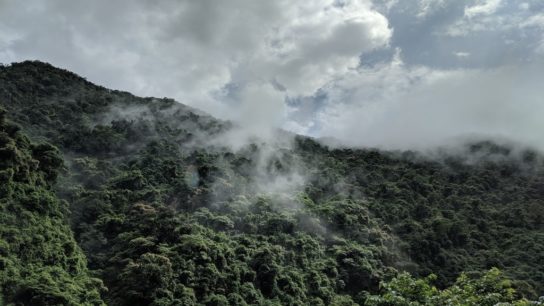Foresting bathing is a fantastic natural way to promote relaxation and a deeper connection with the environment. Natural mental wellness remedies continue to be helpful for those who cannot find the relief they have been seeking through daily medication intake and consistent psychotherapy. Below is an examination of forest bathing and its long-term mental enhancement benefits.
__
Now more than ever, preserving mental wellness is a top priority for folks across the globe. People are always looking for new ways to destress in a spiritually impactful way. Though it is easy to get wrapped up in fad practices that show little results, there has been an increased emphasis on natural mental clarity tactics due to their proven efficacy.
Forest bathing, a mind relaxation practice originating in Japan, allows individuals to use nature to ground themselves and escape from the tensions of the world. In this piece, we explore the history of forest bathing and offer insight into ways you can use this technique in your daily life.
You might also like: Explainer: What Is Climate Anxiety?
Japanese Forest Bathing: A Brief History
Forest bathing, otherwise known as shinrin-yoku, is a Japanese physical activity that began in the 1980s as a response to the rise of technology and increasing tech dependence. The term was created in 1982 by Tomohide Akiyama, director of the Japanese Forestry Agency at the time.
This mindfulness method entails performing leisurely outdoor activities in a forest, whether that be going on a long walk or lying in the grass under the sun, taking deep, calming breaths in the process.
As forest bathing grew in popularity, multiple studies were conducted to assess the physiological benefits.
Yoshifumi Miyazaki, a Chiba University professor in Japan, sought to explore the impact of nature on feelings of relaxation. Miyazaki conducted his research on the island of Yakushima, an island in Japan’s Kagoshima Prefecture home to beautiful cedar trees. Five individuals were instructed to walk about the cedar forest twice a day, while also taking a similar 40-minute stroll around a temperature-controlled laboratory. The study’s subjects appeared more relaxed when going on nature walks, and salivary cortisol levels, an indicator of stress, were lower in comparison to data collected from the lab walks, proving that the human brain experienced positive effects when exposed to the natural forest environment.
Another study conducted by Nippon Medical School in 2005 proved that forest bathing increased “Natural Killer” (NK) cell activity, a process that contributes to higher bodily immune defenses against infections and cancer.
This type of response to regular environment immersion is not uncommon. Other studies have shown that an overwhelming percentage of those who have taken part in efforts to save the Earth or practiced eco-conscious lifestyle choices tend to experience enhanced mental wellness. As people continue to look for ways to trade in their daily medications for natural remedies, forest bathing is yet again becoming a popular way to find consistent mental relief.
Using Forest Bathing for Mental Health Enhancement
You do not have to be an expert in forest bathing to start using the practice for your benefit. Those who suffer from anxiety may find this a useful daily activity that will allow them to become more physically active without overexerting themselves, which can prompt a panic response.
Sensory stimulation is one of the best ways to ground yourself and alleviate anxiety symptoms. Exploring nature through forest bathing gives you the chance to use all of your senses. You can breathe in the clean air, hear birds chirping and life teeming, taste fresh water, touch moss and tree bark, and see the sparkling blue sky looming above you. Getting in touch with nature through visceral means is the perfect way to keep yourself from getting lost in your head and allowing your thoughts to overwhelm you.
Another important thing to do to prepare for forest bathing is to bring some sort of refreshment with you. Nutrition is a crucial part of mental wellness, and excessive hunger or thirst will counteract the positive effects of nature immersion. Pack a small, lightweight bag with a few snacks, like trail mix or fruit snacks, and a water bottle, preferably one with stainless steel insulation. The goal is to make sure you are as relaxed as possible when exploring the elements so you can truly get the best results from forest bathing.
To maximize the effects of forest bathing, it is essential to dress for the occasion. Comfort is key – the last thing you want to be focused on is how your jeans are too tight or your coat isn’t warm enough. If you are exploring the forest in the winter or fall, wear flexible clothing in fabrics like cotton to prevent excessive sweating under your outwear. Be sure to bring properly insulated outerwear in subtle, natural colors. This will lessen anxiety about drawing attention to yourself during your outdoor trek.
As you prepare for your forest bathing journey, it is important to remember your relationship to the environment is a reciprocal one. Getting the physical and mental enhancement you are looking for is not just about wearing the ideal outfit or bringing the right resources for forest bathing – it requires active environmental conservation efforts and education.
Forest Conservation and Your Health
Deforestation and adverse environmental action are prevalent issues. Trees have a massive impact on our well-being, and getting involved in conservation efforts, as mentioned before, will only benefit you both presently and in the long run.
The mass destruction of trees is one factor that can quickly lead to a planetary demise. Trees use photosynthesis to remove carbon dioxide from our environment, in turn producing the oxygen we need to survive. However, deforestation means excess carbon dioxide in the air, leading to rapid global warming and overall poor air quality. Reports have shown that deforestation efforts have led to an excess of nearly 5 billion tons of carbon dioxide (CO2), a staggering statistic that will only grow with time if we do not find a way to intervene.
Ecotherapy is food for the mind and soul, and it can involve much more than taking an afternoon stroll in the forest. Joining a local eco-activism effort or donating money to charities that focus on preventing deforestation is a fantastic way to support your community and personal mental health. This, along with regular forest bathing, may just be the solution you have been searching for to soothe persistent mental health concerns.
Featured image: Pexels
You might also like: How Does Deforestation Affect the Environment?


















